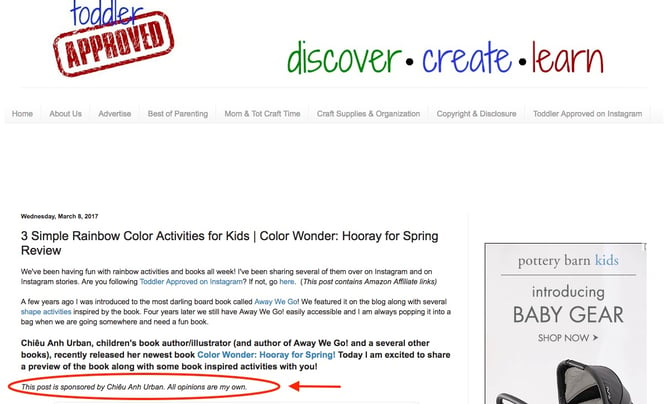
How much digital content do you consume on a daily basis?
It’s tough to put a number on that, isn’t it? Here’s an even tougher question: How much of that content do you genuinely trust — especially when it comes to an investment in a product or a service?
According to Twitter, if you really only trust your friends and family for this information, you’re part of the majority. But if you also have the highest trust in influencers for these recommendations, you’re far from alone — 49% of survey respondents are right there with you.
But what is an “influencer”? According to NeoReach, it’s “an individual with an online presence who has the potential to influence the opinions and behaviors of your target audience.” Because these folks — like bloggers and social media personalities — build a following over a long period of time by producing interesting, quality content, people begin to trust them. They’re relatable, and their opinions become respected. 
That’s why brands see the value of turning to influencers to reach or engage new audiences — it’s a way to broadcast their messages as told by an authoritative source that people actually pay attention to. And no matter your industry, there’s likely an opportunity for your brand to connect and collaborate with influencers. Below, we’ve outlined seven tactics to try.
7 Ways to Work with Influencers
1) Gifting Goods and Services
One of the easiest way to expose your brand to potential customers is to get it into the hands of the influencers it listens to. Identify bloggers who share the same aesthetic as your brand — if they love your gifted goods and services, that’s likely to give them a reason to share positive feedback about it with their readers and viewers. That makes research a crucial first step to finding an influencer, since you’ll want an influential partner with whose audience you’ll resonate. For example, if you work for a company that manufactures auto parts, it might not make sense to partner with a fashion blogger.
But whether you’re gifting a tour of your facility or free product, you’ll want to work with bloggers that produce high-quality content — the goal is to make the influential messaging about your brand highly shareable.
It’s important to note, however, that gifting goods and services doesn’t guarantee exposure. While many influencers will accept gifts, that doesn’t equate with a promise of editorial coverage. In fact, some prefer to be paid for coverage in addition to any gifts they receive — some influencers with followers in the millions, for example, receive an average of $100,000 for a earned post (that’s what it’s called when a brand receives, or earns a mention from an influencer). So if you’re new to influencer partnerships, or your budget is limited, don’t be afraid to start on a smaller scale.
Communication is imperative throughout the process of discovering and working with an influencer. If you don’t have a ton of merchandise to give away, get in touch with the blogger before sending out gifts to agree on specifics first. That way, if the person really wants to charge you, you can do some math on your end to determine the ROI of the partnership.
Here’s an example of this technique. When TomTom gifted influential “lifestyle and fitness enthusiasts” with its new fitness tracker, 47% of whom shared it, that helped the brand gain exposure from numerous posts:
Source: IMA
2) Sponsored Posts
Sponsored posts serve as a less labor-intensive way for brands to work with influencers — bloggers in particular. Essentially, a sponsored blog post is one that a blogger is paid to publish about a brand, on her own blog, in her own voice. And while you can supplement the influencer with important points you’d like her to cover in the post, writing the content in her own voice can help maintain a consistent appeal to her readers.
If the blogger is following FTC guidelines, however, she’ll have to include a small note somewhere in the post to indicate that the story was sponsored by the brand, but that the opinions expressed in the post are her own.
Partnering with bloggers on these types of posts can be great for gaining awareness and securing a few valuable links from authoritative domains.
Children’s book author Chiêu Anh Urban enlisted parenting bloggers to promote one of her activity books. Here’s an example of one such sponsored post from the blog Toddler Approved:

3) Product Reviews
While this technique is often a result of gifting, product reviews from influencers that align with your brand can serve as a powerful way to convince potential customers to buy your product or service. Remember, influencers have grown to become one of the most trusted online resources. And with 81% of shoppers conducting online research before making big purchases, the discovery of these reviews can — pardon the pun — influence their decisions. Here’s an example of how TechnologyAdvice reviewed accounting software platform Xero:
Again, merely sending your product to an influencer doesn’t guarantee coverage — you have to build communication and nurture the relationship. Also, make sure your brand will be portrayed in a positive light. While you can’t necessarily stop someone from producing a negative review of your product or service, you can get an idea of how a given influencer might talk about your brand by looking at her other reviews. If she’s generally not receptive to your type of product, then it might be best to look elsewhere.
4) Giveaways
At risk of sounding like a broken record: Sending products to an influencer, even for a giveaway, does not guarantee coverage. However, if an influencer agrees to work with you on a giveaway, it’s a great way to build excitement around your brand. After all, who doesn’t love free stuff?
It’s especially important here to partner with an influencer who aligns with your brand identity — if her audience isn’t a good fit for your product, there might not be a ton of enthusiasm around a chance to win something from you, even if it’s free. And when it come to deciding what to give away, we suggest a few guidelines:
- Offer something of real value. You want to make it worth the audience’s time to enter.
- Make sure it’s something you can afford to give away.
- Remember that the influencer ultimately knows her audience better than you do, so be receptive to feedback regarding what she thinks you should be giving away.
As for the process of entering the giveaway, don’t make it too complicated for people to participate — but do require them to do something low-effort that somehow benefits your marketing goals. For example, if you want to increase your social media following on a specific channel, you can ask participants to post a photo on Instagram with a caption about the giveaway and a branded hashtag. Here’s an example of how the South Florida Lifestyle blog partnered with a number of brands on social media for a giveaway:
If an influencer wants to be paid in exchange for including your brand in a giveaway, think about the work required on her end — she has to tease it, promote it, track responses, and pick a winner. Of course, compensation could be negotiable, but if this person has the right kind of reach, don’t immediately turn away a potential partnership because of the cost.
5) Influencer Competitions
Then, there’s another kind of contest — the kind that invites the influencers themselves to participate in a competition. The prize? That can be anything ranging from exclusive brand features on your channels, a chance to travel (on your dime, of course ) somewhere on behalf of the brand as an ambassador, or the opportunity to sit on a “best of” list, just to name a few options.
But remember, the best influencers get approached a lot, so be prepared to answer the question, “What’s in it for me?” Go equipped with information about your own reach, audience, and the ways that participation in a contest ultimately benefits the influencer.
Skype executed a promotion like this one with its “Your City, Your Passion” competition. Influencers around the world were encouraged to share why they’re so passionate about their respective cities, with the hope of winning a Skype session with a famed expert within their given field — for example, Epic Mealtime creator Darren Morenstein.
6) Guest Posts
When it comes to influential bloggers, one of the strongest ways to reach their respective audiences is by contributing a guest post on their publications. Not only can it help to establish you as an industry expert — one that’s legitimate enough to earn a byline on a highly-trusted platform — but also, it’s a way to gain backlinks from a high-authority site.
Again, this approach requires some research to find out whether or not a given blogger even accepts guest posts. Once you find one who does, the site might have editorial guidelines. Read those closely — editors are extremely busy and likely receive a high volume of pitches.
Back when his company was in its early stages, Videofruit founder Bryan Harris earned quite a name for himself after penning a guest post on the influential OkDork blog. According to Entrepreneur, Harris saw “astronomical” results within the same day his post was published:
- A 500% increase in pageviews
- A 600% increase in unique pageviews
- A 6% decrease in bounce rate
7) Affiliate Marketing Programs
As a marketer, you may have come across the term “global affiliate network.” According to Rakuten Marketing, it’s essentially a system to “connect advertisers with publishers to reach new audiences and influence repeat purchases.” In other words, it helps brands that join the network connect with the influencers that best align with their products and services.
Many of these programs work on a cost-per-sale or cost-per-acquisition model, which means that you could incur a cost when you earn coverage from an influencer. Each network is different, so it might be worthwhile to explore those that have been named as top-ranked, like this list from mThink.
Invest in Influencer Marketing
There is a shift in how marketers are reaching consumers. With so much digital “noise,” especially from brands, customers like the marketing they come across to personally resonate with them — maybe that’s why, for example, the open rate for personalized emails is 6.2% higher than those that aren’t.
And that’s why consumers also turn to people that they know — or, at least, are familiar with, like influencers — for product and service recommendations. There’s reason to invest in partnering with content creators who fall within these trusted resources, to build awareness of your brand and what you produce. The options are plenty, but the key is finding the right partner, with the right audience.
How have you worked with influencers? Let us know in the comments.
Powered by WPeMatico





